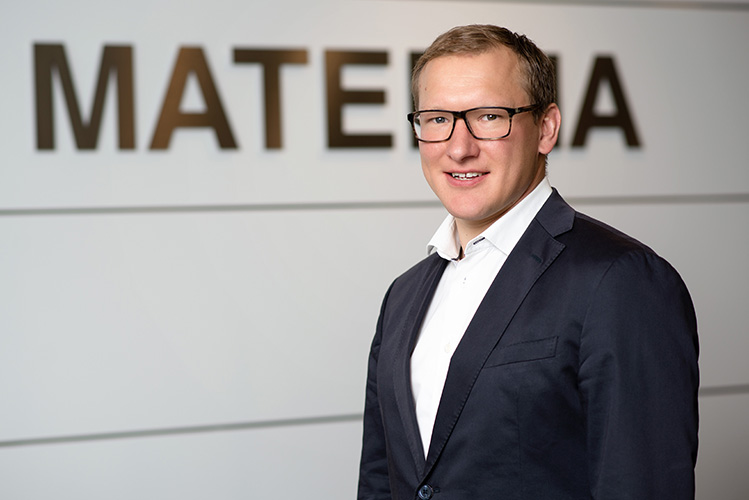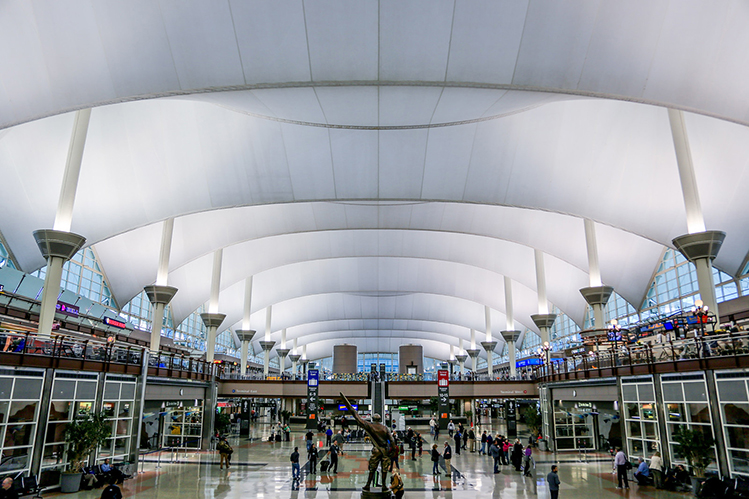Dr Georg Oschmann, Executive Vice President, Head of the Mobility Business Line, Materna IPS, is speaking at this year’s ACI Airport Exchange in a session focused on ‘Putting digital transformation at the heart of airport development’. He shared a preview of his thoughts with Ross Falconer.
Denver International Airport (DEN) has begun construction on the $650 million (€560m) three-and-a-half-year renovation project of its Great Hall. The airport aims to create the “terminal of the future” with enhanced security and improved passenger experience.
As part of the ongoing renovation of DEN, the redesigned airline ticket counters in the Great Hall will be equipped with the world’s largest installation of self-service equipment. Materna’s solution, including 176 hybrid self-bag-drop units and 40 check-in kiosks, will be installed by 2020.

Dr Georg Oschmann, Executive Vice President, Head of the Mobility Business Line, Materna IPS: “As self-bag-drop is just at the beginning in the US, there is a high potential for further installations. Denver will have the world’s largest installation of self-bag-drop units, and is seen as a breakthrough of this service. It is also the largest project in Materna’s history.”
“The contract with Denver Airport is ‘a beacon project in the USA’ and an important milestone in Materna’s international activities,” says Dr Georg Oschmann, Executive Vice President, Head of the Mobility Business Line, Materna IPS.
Materna has already equipped airports in North America such as Toronto, Montréal and Quebec, among other places, with its technology, and is focusing internationally on the markets in America and Asia. “It shows that Materna’s strategy worked out and investments in the American market were the right way,” Oschmann adds. “As self-bag-drop is just at the beginning in the US, there is a high potential for further installations. Denver will have the world’s largest installation of self-bag-drop units, and is seen as a breakthrough of this service. It is also the largest project in Materna’s history.”
Denver’s self-bag-drop solution comprises a classic agent counter combined with a self-bag-drop unit and scanner portal positioned over the conveyor to scan baggage tags. The scanner unit ensures safe baggage handling processes by only accepting baggage of the correct size and weight.
The hybrid solution is easy to customise and integrate. The kiosks are equipped with Materna’s CUSS platform, which all airlines can use. Indeed, some major airlines are already undergoing integration.
“This solution is ideal for either a typical self-bag-drop use or an agent service if required, which leads to the highest flexibility for the airport regarding opening times, passenger flows and peak times,” says Oschmann.
Virtual Reality (VR) services also played a key role in the Denver project. Materna offers customers the opportunity to create their individual VR terminal to illustrate how a certain solution will fit into the airport’s environment, and how to use the self-bag-drop units.
“This means we develop a computer-generated simulation of a three-dimensional image or environment and create multiple situations by using a built-in configurator to place any objects in any airport,” Oschmann explains. “For DEN, we made a visualisation of Denver Airport and presented the self-bag-drop solutions, and the overall look and feel. Denver’s project managers could experience the process in Virtual Reality. That was an immense advantage for the entire proposal phase, as we saw challenges in the project ahead of time. The VR demo allows all parties to use, have input, and experience different scenarios. The system we use is Oculus Rift.”

The hybrid solution provided to DEN is a specially-designed unit consisting of a classic agent counter combined with a self-bag-drop touchpoint, scanner portal and conveyor belts.
The Great Hall check-in terminal, which is under the tents of the airport’s Jeppesen Terminal with its striking design, is DEN’s distinctive trademark. The goal of the renovation project is to keep up with the airport’s consistent growth (passenger numbers rose +4.3% to 43 million in the first eight months of 2018), thereby increasing capacity, safety and security, and improving passenger experience. The project will be completed in 2021.







